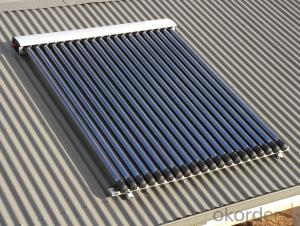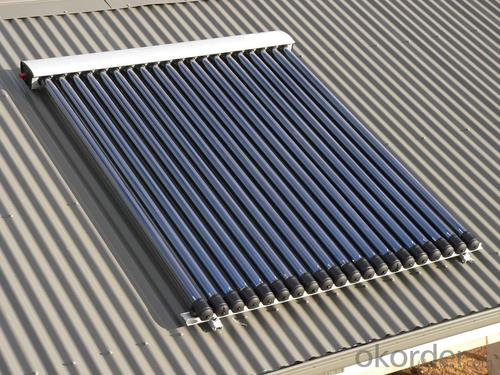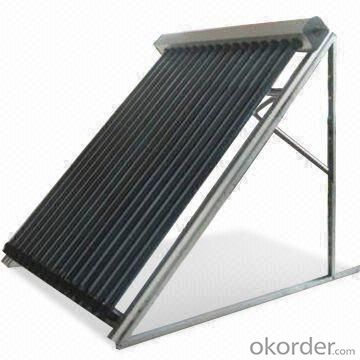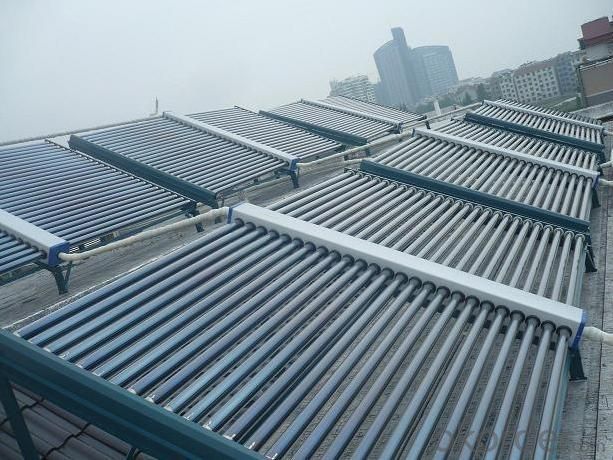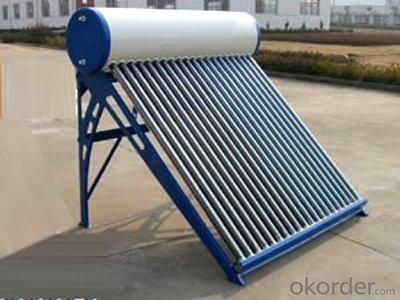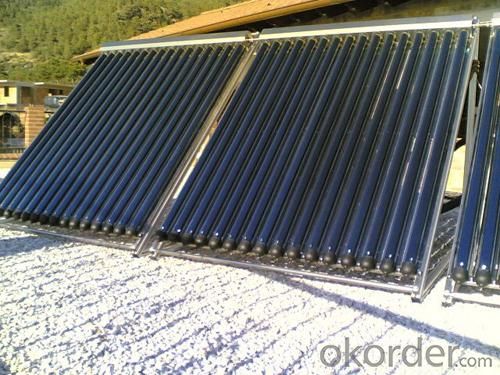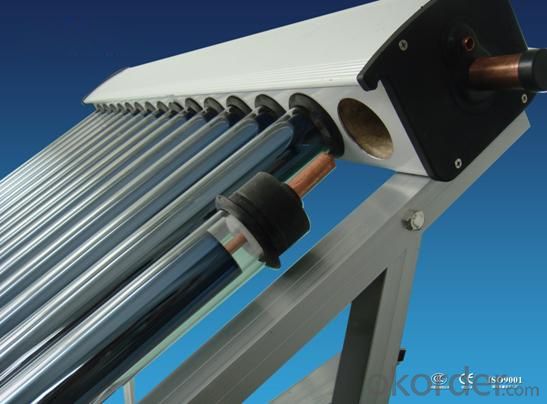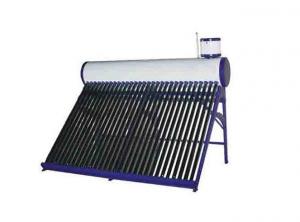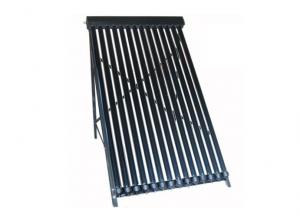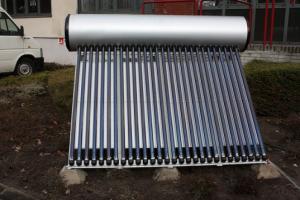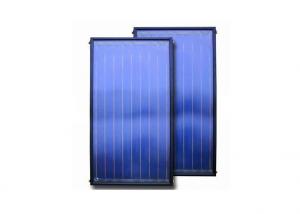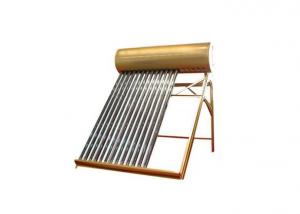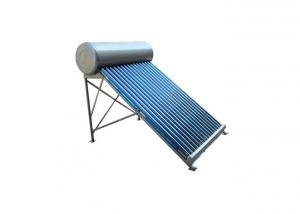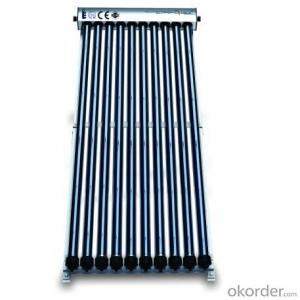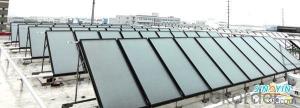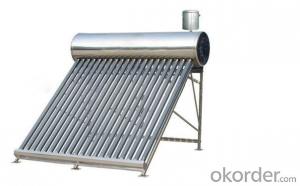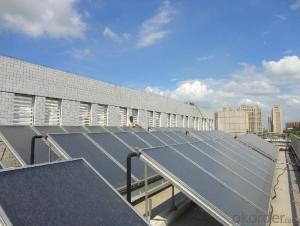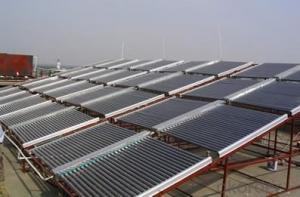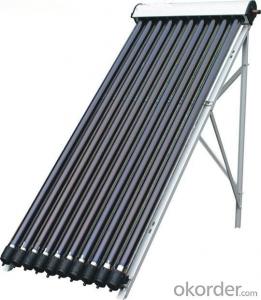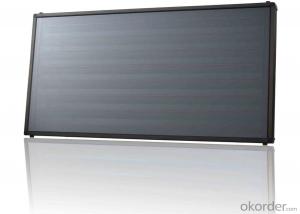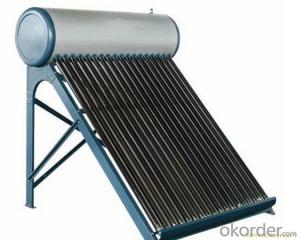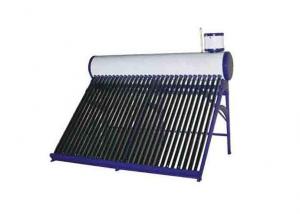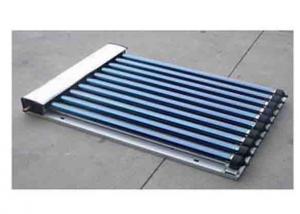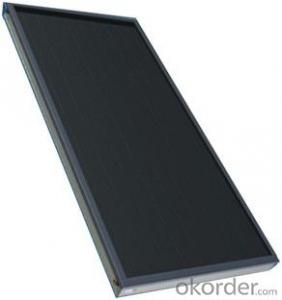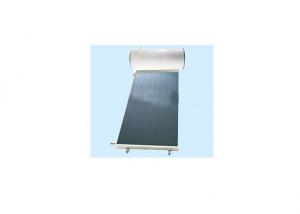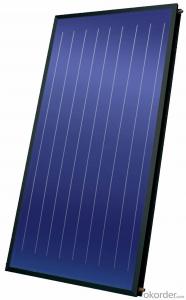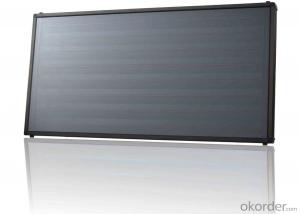Eagle Sun Solar Collectors - High Efficiency 2024 New Technology
- Loading Port:
- China main port
- Payment Terms:
- TT OR LC
- Min Order Qty:
- 5 set
- Supply Capability:
- 10000 set/month
OKorder Service Pledge
OKorder Financial Service
You Might Also Like
Specification
manifold (inner) | red copper |
manifold (exterior) | aluminum alloy |
glass tube dimensions | 58mm * 1800mm |
daily efficiency | ≥55% |
heat preservation | 72 hours |
hail resistance | 25mm |
max pressure | 7 bar |
coating of vacuum tube | ALN/AIN-SS/CU |
heat pipe | anti-freezing > -35 degree |
certificate | Solar Keymark, EN12975,SRCC |
Serious Product
Models | L*W*H mm | Vacuum tube | Power output | Efficiency | Header mm | Frame | container loading 20FT/40HQ sets | Gross Weight kg |
SHC-8 | 1917*910*133 | 58*1800*8pcs | 939W | 0.668 | Φ35/1.0 | AL alloy | 185/445 | 27 |
SHC-10 | 1917*1130*133 | 58*1800*10pcs | 1189W | 159/385 | 33 | |||
SHC-12 | 1917*1350*133 | 58*1800*12pcs | 1440W | 149/358 | 40 | |||
SHC-15 | 1917*1680*133 | 58*1800*15pcs | 1815W | 120/290 | 49 | |||
SHC-18 | 1917*2010*133 | 58*1800*18pcs | 2191W | 100/242 | 59 | |||
SHC-20 | 1917*2230*133 | 58*1800*20pcs | 2442W | 87/210 | 66 | |||
SHC-22 | 1917*2450*133 | 58*1800*22pcs | 2692W | 83/202 | 72 | |||
SHC-24 | 1917*2670*133 | 58*1800*24pcs | 2943W | 77/188 | 79 |
Packaging & Delivery
Packaging Details: | Exporting Carton with big foaming protection |
Delivery Detail: | In 10-15 days |
Loading Quantity
Model | Tube | Tube Q.T.Y | Loading Q.T.Y/40HQ |
GSC15 | 58*1800mm | 15pcs | 315sets |
GSC18 | 58*1800mm | 18pcs | 265sets |
GSC20 | 58*1800mm | 20pcs | 248sets |
GSC22 | 58*1800mm | 22pcs | 225sets |
GSC25 | 58*1800mm | 25pcs | 200sets |
GSC30 | 58*1800mm | 30pcs | 168sets |
Details of solar collector:
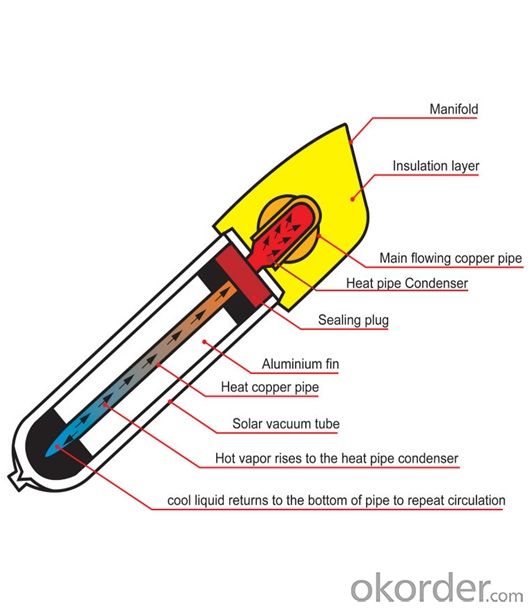
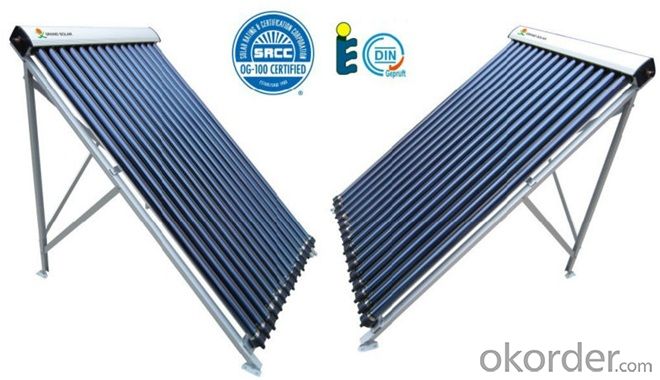
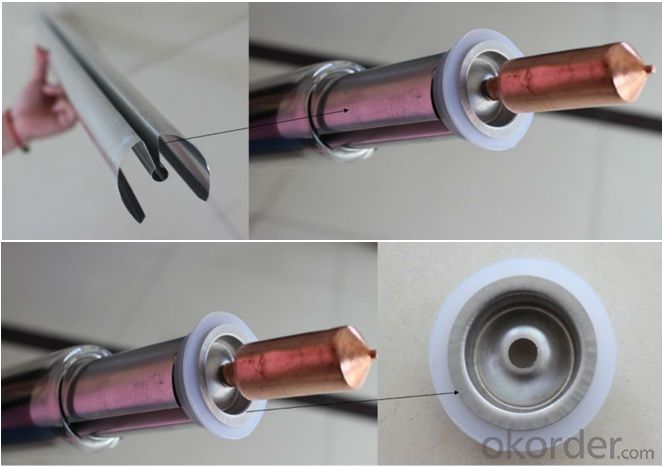
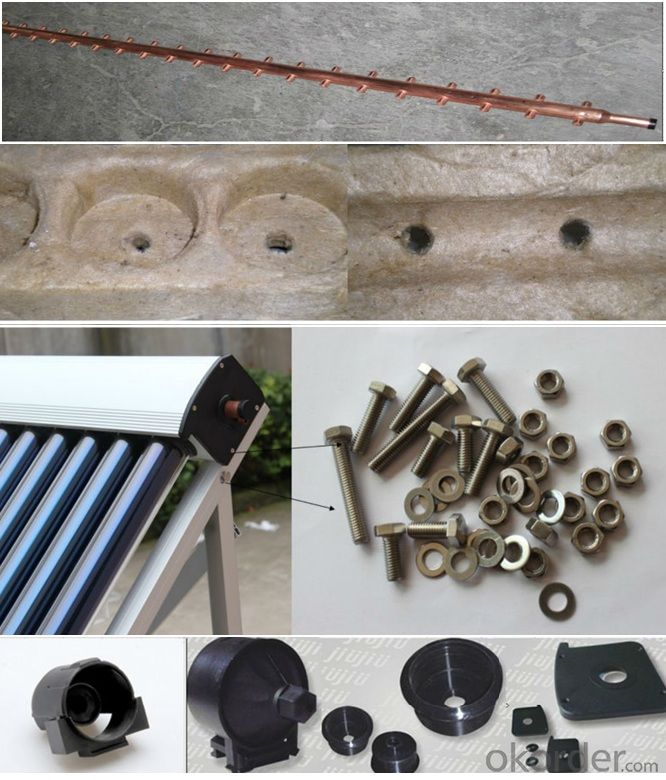
- Q: Can solar collectors be used for heating retirement homes and assisted living facilities?
- Yes, solar collectors can certainly be used for heating retirement homes and assisted living facilities. Solar thermal systems can efficiently capture and store the sun's energy to provide heat for water and space heating needs in these facilities. By utilizing solar collectors, retirement homes and assisted living facilities can reduce their dependence on traditional heating systems and lower energy costs while also contributing to a greener environment.
- Q: How much space is required for installing solar collectors?
- The space required for installing solar collectors varies depending on the size and type of the collectors. On average, a solar collector for residential use may require around 10 to 100 square feet of space. However, it is recommended to consult with a solar installer to determine the specific space requirements for your particular setup.
- Q: Can solar collectors be used in all climates?
- Solar collectors can be used in all climates, although their efficiency may vary depending on the amount of sunlight available. In regions with less sunlight, additional solar panels or larger collectors may be needed to generate sufficient energy. Additionally, certain types of solar collectors, such as evacuated tube collectors, are more suitable for colder climates as they are more efficient in colder temperatures. Overall, while solar collectors can be used in all climates, their effectiveness may be influenced by the local weather conditions.
- Q: Can solar collectors be used for heating beverage production facilities?
- Yes, solar collectors can be used for heating beverage production facilities. Solar thermal systems, which use solar collectors, can efficiently capture the sun's energy and convert it into heat. This heat can then be used to warm water or other fluids required for the beverage production process. By utilizing solar collectors, beverage production facilities can reduce their reliance on fossil fuels and lower their energy costs while also promoting sustainability.
- Q: Can solar collectors be used in incineration plants?
- Yes, solar collectors can be used in incineration plants. Solar collectors are devices that convert solar energy into heat energy, which can then be used for various purposes. In the case of incineration plants, solar collectors can be used to provide heat for the incineration process. Incineration plants are facilities where waste materials are burned at high temperatures to generate energy. The heat generated from the combustion process is usually used to produce steam, which in turn drives turbines to generate electricity. By using solar collectors, the heat required for the incineration process can be supplemented or even replaced, reducing the reliance on fossil fuels and decreasing the carbon emissions associated with the plant's operation. Solar collectors can be integrated into the design of incineration plants to capture the sun's energy and convert it into heat. These collectors typically consist of a series of solar panels or tubes that absorb sunlight and transfer the heat to a working fluid, such as water or oil. This heated fluid can then be used to provide the necessary heat for the incineration process. The use of solar collectors in incineration plants offers several advantages. Firstly, it reduces the reliance on fossil fuels, making the plant more sustainable and environmentally friendly. Secondly, it can help to lower operating costs by offsetting the need for conventional heat sources, such as natural gas or coal. Finally, solar collectors can enhance the overall efficiency of the incineration process by providing a consistent and reliable source of heat. However, it is important to note that the integration of solar collectors in incineration plants requires careful planning and engineering. Factors such as the plant's location, available sunlight, and the design of the solar collector system need to be taken into account to ensure optimal performance. Additionally, the size and capacity of the solar collector system must be properly sized to meet the heat requirements of the incineration process. In conclusion, solar collectors can indeed be used in incineration plants to provide heat for the incineration process. By harnessing the sun's energy, these collectors offer a sustainable and cost-effective solution to reduce reliance on fossil fuels and decrease carbon emissions in the operation of incineration plants.
- Q: How much space is needed to install a solar collector?
- The space needed to install a solar collector can vary depending on the size and type of collector being used. Typically, a residential solar collector for heating water or generating electricity would require an area of around 100-250 square feet. Commercial or larger-scale solar collectors may require much larger spaces, sometimes spanning several acres.
- Q: Can solar collectors be used in areas with high temperatures?
- Yes, solar collectors can be used in areas with high temperatures. In fact, high temperatures can even enhance the efficiency of solar collectors as they allow for increased energy absorption. However, it is important to consider the design and materials used in the solar collectors to ensure they can withstand extreme temperatures and operate effectively in such conditions.
- Q: Can solar collectors be used in tidal power plants?
- No, solar collectors cannot be used in tidal power plants as they generate electricity from the movement of tidal currents, while solar collectors rely on sunlight to produce power.
- Q: Are solar collectors suitable for countries with limited sunlight?
- Solar collectors may not be the most effective solution for countries with limited sunlight as they heavily rely on solar radiation to generate electricity or heat. However, depending on the specific circumstances, alternative technologies or hybrid systems could potentially make solar collectors a viable option in such countries.
- Q: Where are solar collectors commonly used?
- Solar collectors are commonly used in various locations and applications around the world. One of the most common uses of solar collectors is in residential homes, where they are installed on rooftops to generate clean and sustainable energy for the household. Solar collectors are also commonly used in commercial buildings, such as offices and factories, to offset the energy consumption and reduce carbon emissions. In addition to buildings, solar collectors can be found in large-scale solar power plants, where they are used to generate electricity on a utility scale. These solar power plants often have vast arrays of solar collectors that track the movement of the sun and convert sunlight into electricity. Solar collectors are also used in remote and off-grid locations, where access to traditional energy sources may be limited. Examples include rural areas, campsites, and even space stations. In these cases, solar collectors provide a reliable source of energy for various needs, such as lighting, heating, and powering electronic devices. Furthermore, solar collectors are commonly used in the agricultural sector. They can be utilized for water heating in greenhouses, providing optimal conditions for plant growth. Solar collectors are also used for irrigation purposes, where the collected solar energy powers pumps to distribute water to crops. Overall, solar collectors are versatile and can be used in a wide range of applications, including residential, commercial, industrial, remote, and agricultural settings. Their ability to harness the power of the sun makes them a valuable and sustainable energy solution.
Send your message to us
Eagle Sun Solar Collectors - High Efficiency 2024 New Technology
- Loading Port:
- China main port
- Payment Terms:
- TT OR LC
- Min Order Qty:
- 5 set
- Supply Capability:
- 10000 set/month
OKorder Service Pledge
OKorder Financial Service
Similar products
Hot products
Hot Searches
Related keywords
